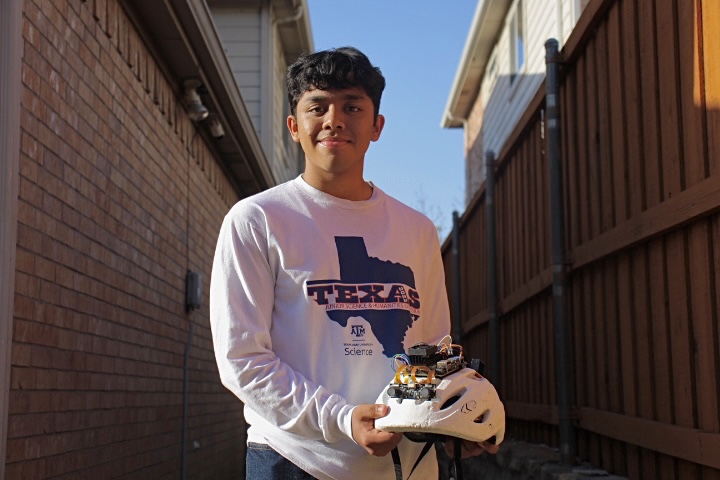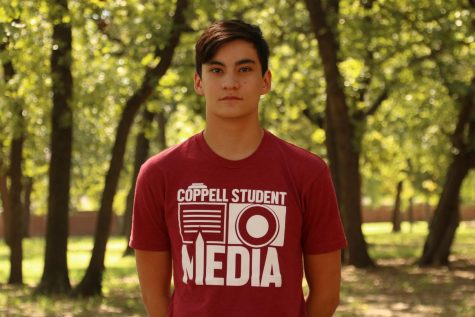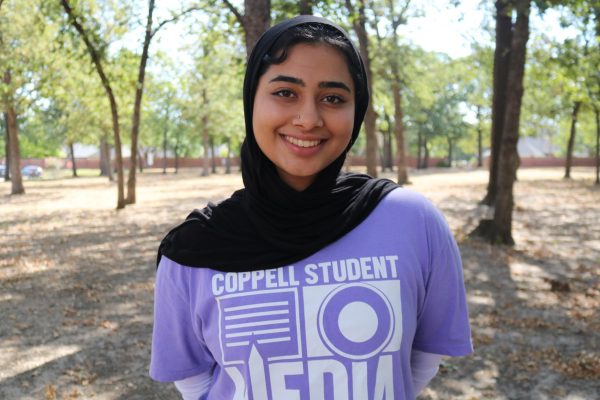Growth in competition: Goel rising to the challenge
Coppell High School sophomore Sarang Goel developed an Intelligent Vision System (IVY) for the visually impared, which helps blind people navigate and sense their surroundings. For the fourth year in a row, Goel placed in the top three at the Texas Science and Engineering Fair in March.
April 19, 2022
Competition can be intimidating.
Competing in an event, whether it be sports, a spelling bee or writing competitions, forces participants to think outside the box. It forces them to think about how they can rise above the challenge. The idea that one must perform better than another to win can create great anxiety among competitors, but Coppell High School sophomore Sarang Goel is one who knows what it takes to perform.
A Technology Student Association (TSA) officer and science enthusiast, Goel has just finished competing in this year’s Texas State Science and Engineering Fair (TXSEF) held on campus at Texas A&M. This year is his fourth year competing in the science fair. He also participated in his seventh grade, eighth grade and freshman year. With a second place finish in TXSEF this year, Goel has qualified for a spot in the International Science Fair in Atlanta from May 7-13.
“I just really enjoy the learning process, like learning all the sciences and [programming] languages.” Goel said. “That’s the major part, just learning in general.”
While Goel has used the fairs as learning experiences, he also competes to meet with other student scientists.
“I like meeting students with similar interests at the fairs,” Goel said. “I get to meet a lot of people outside Coppell.”
While his most impressive performances in the fairs have been within the last three years, Goel showed unique interest in the competition and science fields since middle school. One of the fair coordinators, current CHS science teacher Jodie Deinhammer, recalled her astonishment when first seeing his science fair project when he was in sixth grade. The project had to do with maximizing cardiac output, involving research into blood vessel diameter and various other aspects of the cardiovascular system.
“I had never met Sarang until he turned in his first science fair project,” Deinhammer said. “But when he did, I was one hundred percent convinced that he didn’t do it.”
When Deinhammer questioned him as to the honesty of his work, she was even more surprised to find out Goel knew everything about the topic and project.
“I remember pulling him out of class to ask him questions about it and he was so excited to talk about it,” Deinhammer said. “There were some things he said and I truly didn’t know what he was saying and I remember thinking, ‘this kid is smarter than I am.’”
Goel stands out from his competition in the complexity of his projects. From designs for devices for gauging and cleaning pollutants out of cabin air in a vehicle to helmets helping visually impaired people to navigate, Goel has a clear propensity for creating projects of both great nuance. But beyond demonstrating sheer creativity, science fair competitors must also be able to explain their projects and answer questions.
“[Goel] always understands what his project is about,” CHS science teacher and fair coordinator Holly Anderson said. “That’s what makes the difference between competitors who make it to regionals and competitors who make it to internationals. The fact that he can talk about his project scientifically and answer questions and things like that is what sets him apart from his competition.”
Follow Nathan (@WalterBotell) and @CHSCampusNews on Twitter.











